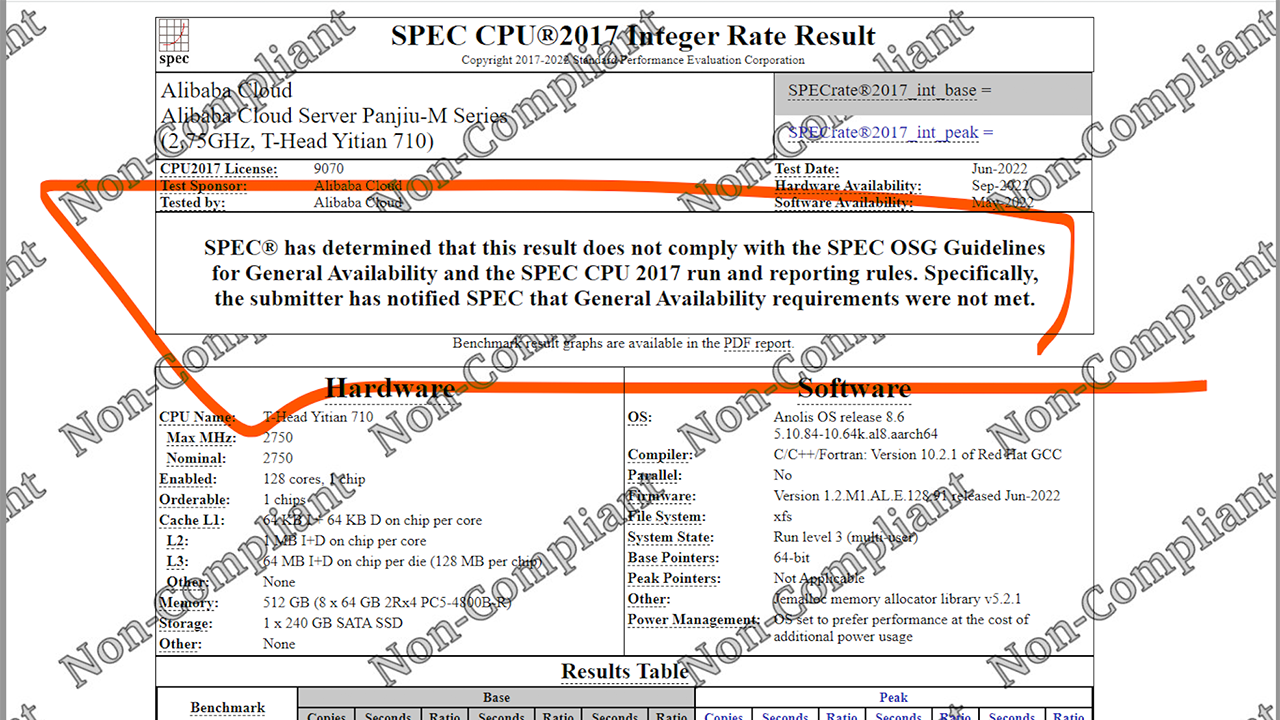Chinese 128-Core CPU World Record Expelled From Rankings: No Availability
Biden's sanctions work?
The SPEC Committee has expelled the Chinese-produced Yitian 710's world record result in the CPU 2017 benchmark, an industry benchmark for CPUs, from its ranking, citing availability issues. We were impressed when Alibaba introduced its 128-core processor made on TSMC's N5 node about a year ago. We were even more impressed when this CPU broke some records about five months ago. However, we felt a bit troubled due to the limited availability of preview samples, even in Alibaba's cloud.
"SPEC has determined that this result does not comply with the SPEC OSG Guidelines for General Availability and the SPEC CPU 2017 run and reporting rules," a statement by SPEC reads. "Specifically, the submitter has notified SPEC that General Availability requirements were not met."
We don't know whether the lack of availability occurred because of the United States' curbs against the Chinese semiconductor sector, but that could be the source of the issue.
Alibaba said the Yitian 710 can hit a 440 integer score in SPECint2017, which is comparable to the performance of a two-socket machine powered by Intel's 32-core Xeon Platinum 8362 (64 cores at 2.80 GHz). This remarkable score was allegedly obtained on hardware that was barely available even to users of Alibaba's cloud. The problem for Alibaba is that this level of performance is enough to fall under the new U.S. export rules.

The Yitian 710 server SoC contains about 60 billion transistors, making it one of the most complex processors ever developed. TSMC makes it on one of its N5 (5nm-class) production nodes, which falls under the U.S. sanctions against Chinese semiconductor and supercomputer sectors.
And while American sanctions against the Chinese semiconductor industry are well-known, there is another wrinkle in this story — yields. A 60-billion transistor chip would be prone to poor yields, meaning that a higher percentage than normal of the chips produced will end up in the waste bin. Alibaba indirectly confirmed that its SoC doesn't perform up to the desired spec when it offered a selected few to try an underspecc'd SoC in its cloud. Perhaps yield issues are why it did not procure enough chips to deploy. The lack of availability appears to be why the Yitian 710 was expelled from the SPEC rankings.
Get Tom's Hardware's best news and in-depth reviews, straight to your inbox.

Anton Shilov is a contributing writer at Tom’s Hardware. Over the past couple of decades, he has covered everything from CPUs and GPUs to supercomputers and from modern process technologies and latest fab tools to high-tech industry trends.
-
bit_user ReplyBiden's sanctions work?
Could be an effect, but saying they "worked" presumes a goal. Tactically, one might say they worked.
Thanks for the coverage of this subject, but I have yet to see any clearly state the goal of the sanctions, which leaves the matter open to much wild speculation. Perhaps the underlying rationale hasn't been well-publicized, but some reporters seem to have learned more about that.
https://www.npr.org/transcripts/1129990818
I hope further articles can delve more into the rationale or objectives of these sanctions, based on whatever the Biden administration has actually said, or what other well-placed sources can reveal. -
Seeing as people simply can't play nice and keep the politics out of these discussions this thread is now closed. Those responsible know who they are.Reply